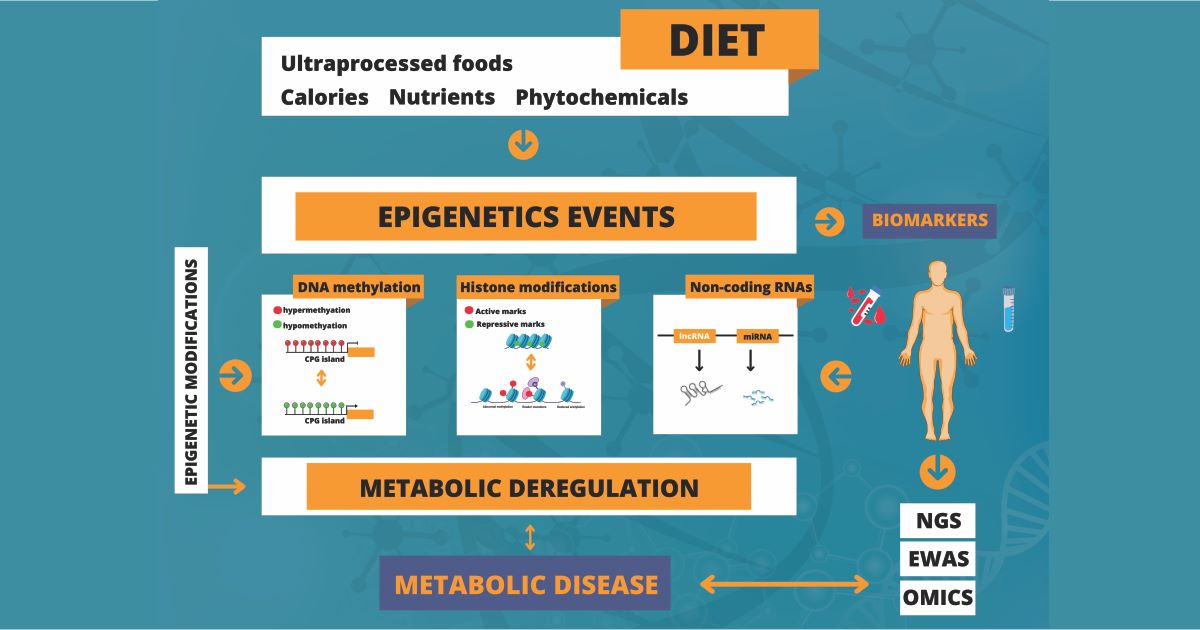Role of Diet-Induced Epigenetic Modifications on Promoting or Preventing Metabolic Diseases
A special issue of Metabolites (ISSN 2218-1989). This special issue belongs to the section "Nutrition and Metabolism".
Deadline for manuscript submissions: closed (15 April 2023) | Viewed by 6406

Special Issue Editors
Interests: precision nutrition; nutritional genomics; nutrigenetics; cancer
Special Issue Information
Dear Colleagues,
Current research has highlighted that organ and systemic damage associated with metabolic diseases might be the result of a complex network of interactions between genetics and the environment, potentially orchestrated by epigenetic mechanisms. Cells exhibit three major interconnected epigenetic systems that can turn genes on or off: (a) DNA methylation, (b) post-transcriptional histone modifications, and (c) non-coding RNAs (including microRNAs). A deeper understanding of the diet’s influence on epigenetic modifications may therefore contribute to the comprehension of disease pathogenesis, to the development of novel treatments, and to the identification of individuals at risk of metabolic disease. This Special Issue of Metabolites is dedicated to publishing state-of-the-art research on nutritional epigenomics. We welcome authors involved in the analysis of epigenetic modifications leading to or preventing metabolic diseases. We welcome the submission of articles covering, but not limited to, the following topics:
- Epigenetic applications for precision nutrition;
- Protocols for clinical trials for the investigation of epigenetic modifications in response to nutrients;
- Studies aiming to investigate the role of specific epigenetic modifications in experimental models;
- Observational studies on epigenetic changes in humans affected by diet-related diseases;
- Studies on the correlation between epigenetic modifications and exposome (e.g., gut microbiome);
- Systematic or comprehensive reviews about any epigenetic question related to nutrition;
- Epigenetic processes with food and other bioactive compounds;
- Epigenetic modifications as clinical biomarkers for metabolic diseases;
- Epigenetics and dietary habits or specific nutrients during prenatal and postnatal life;
- Studies focusing on candidate metabolites and metabolic pathways.
Dr. Maria Aderuza Horst
Dr. Lucas Carminatti Pantaleão
Guest Editors
Manuscript Submission Information
Manuscripts should be submitted online at www.mdpi.com by registering and logging in to this website. Once you are registered, click here to go to the submission form. Manuscripts can be submitted until the deadline. All submissions that pass pre-check are peer-reviewed. Accepted papers will be published continuously in the journal (as soon as accepted) and will be listed together on the special issue website. Research articles, review articles as well as short communications are invited. For planned papers, a title and short abstract (about 250 words) can be sent to the Editorial Office for assessment.
Submitted manuscripts should not have been published previously, nor be under consideration for publication elsewhere (except conference proceedings papers). All manuscripts are thoroughly refereed through a single-blind peer-review process. A guide for authors and other relevant information for submission of manuscripts is available on the Instructions for Authors page. Metabolites is an international peer-reviewed open access monthly journal published by MDPI.
Please visit the Instructions for Authors page before submitting a manuscript. The Article Processing Charge (APC) for publication in this open access journal is 2700 CHF (Swiss Francs). Submitted papers should be well formatted and use good English. Authors may use MDPI's English editing service prior to publication or during author revisions.
Keywords
- precision nutrition
- epigenetic modifications
- programming
- nutrients
- nutritional epigenetics
Benefits of Publishing in a Special Issue
- Ease of navigation: Grouping papers by topic helps scholars navigate broad scope journals more efficiently.
- Greater discoverability: Special Issues support the reach and impact of scientific research. Articles in Special Issues are more discoverable and cited more frequently.
- Expansion of research network: Special Issues facilitate connections among authors, fostering scientific collaborations.
- External promotion: Articles in Special Issues are often promoted through the journal's social media, increasing their visibility.
- Reprint: MDPI Books provides the opportunity to republish successful Special Issues in book format, both online and in print.
Further information on MDPI's Special Issue policies can be found here.







